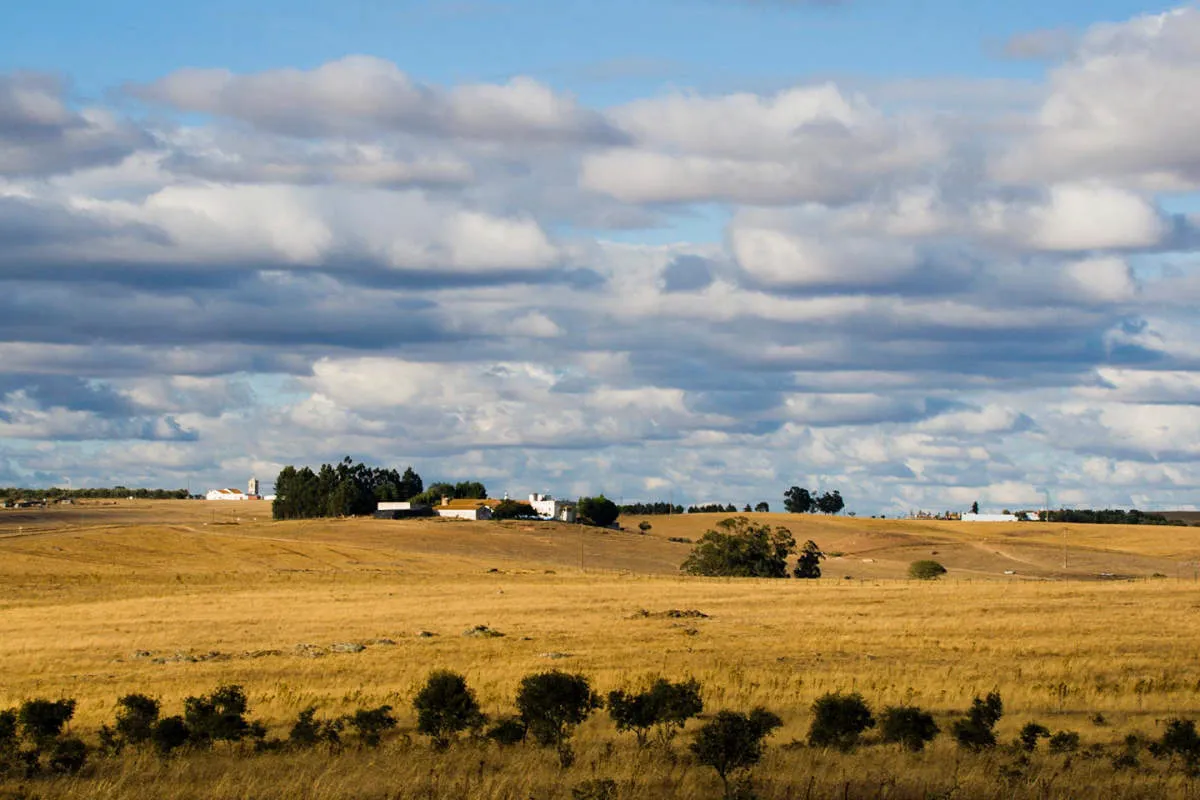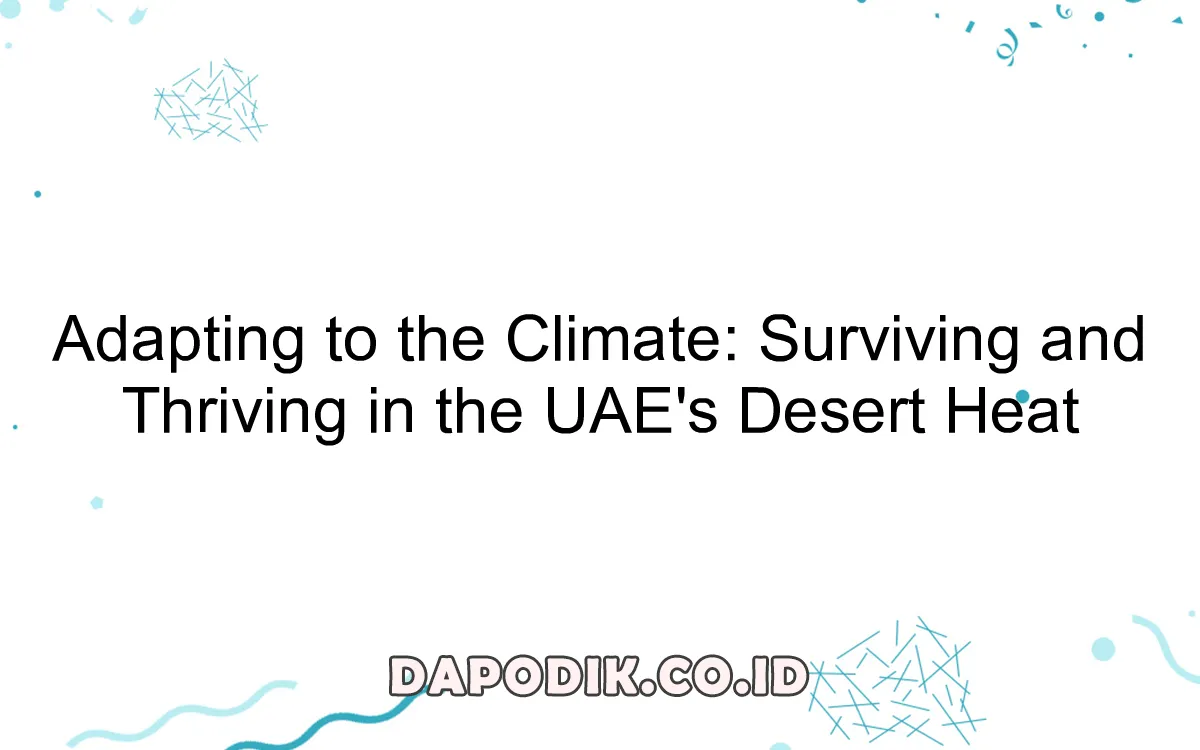Adapting to the Climate: Surviving and Thriving in the UAE's Desert Heat
Adapting to the relentless desert heat of the United Arab Emirates (UAE) is a challenge that locals and expatriates alike must face. In this article, we delve into the strategies and techniques employed by residents to not only survive but also thrive in this extreme climate.
Understanding UAE’s Desert Climate: Weather Patterns and Challenges
The United Arab Emirates (UAE) is known for its harsh desert climate, characterized by extreme temperatures and low rainfall. In order to adapt and thrive in such conditions, it is crucial to understand the weather patterns and challenges posed by the desert heat.
Hot Summers:
During the summer months in the UAE, temperatures can soar above 45 degrees Celsius (113 degrees Fahrenheit). The combination of high heat and humidity can be particularly challenging, with the heat index often exceeding 50 degrees Celsius (122 degrees Fahrenheit). It is essential to take necessary precautions, such as staying hydrated, wearing light and breathable clothing, and seeking shade during peak hours.
Minimal Rainfall:
Rainfall in the UAE’s desert region is scarce, averaging less than 100mm per year. This minimal precipitation poses significant challenges for agriculture and water availability. UAE residents have implemented innovative techniques, such as desalination plants and water recycling systems, to address the water scarcity issue.
Dust Storms:
Another characteristic of the desert climate in the UAE is the occurrence of dust storms. These storms, known as haboobs, are caused by strong winds that lift and carry fine particles of sand and dust across the region. They can reduce visibility and lead to respiratory problems. Taking necessary precautions, such as wearing protective masks and ensuring proper ventilation indoors, is important during such events.
Biodiversity Challenges:
The extreme desert climate poses challenges for supporting diverse ecosystems. However, despite the harsh conditions, the UAE is home to various desert-adapted plant and animal species. Conservation efforts, such as protected reserves and rehabilitation programs, are essential to preserve the unique biodiversity found in the region.
Conclusion:
Understanding the weather patterns and challenges associated with UAE’s desert climate is crucial for adapting and thriving in the extreme heat. By taking necessary precautions and implementing innovative solutions, the residents of the UAE can overcome the difficulties posed by the desert environment.
Staying Safe and Healthy in the Hot Weather

In this article titled “Adapting to the Climate: Surviving and Thriving in the UAE’s Desert Heat,” we will discuss essential tips to stay safe and maintain your health in the hot weather.
1. Stay Hydrated
Drink plenty of water throughout the day to stay properly hydrated. It is recommended to consume at least 8-10 glasses of water daily. Avoid sugary drinks and alcohol as they can dehydrate your body.
2. Dress Appropriately
Wear lightweight and loose-fitting clothes made of breathable fabrics such as cotton. Light-colored clothes also help in reflecting the sun’s heat away from your body.
3. Protect Your Skin
Apply sunscreen with a high SPF (Sun Protection Factor) to shield your skin from harmful UV rays. Wear a hat or use an umbrella to provide additional shade for your face and neck.
4. Seek Shade
Avoid direct exposure to the sun, especially during peak hours (usually between 10 am to 4 pm). Look for shaded areas or use canopies, parasols, or umbrellas when spending time outdoors.
5. Take Breaks
If you need to engage in outdoor activities, be sure to take frequent breaks to rest and cool down. Listen to your body and avoid overexertion, as the heat can quickly exhaust you.
6. Know the Warning Signs
Be aware of the symptoms of heat exhaustion and heatstroke, such as dizziness, nausea, headaches, rapid heartbeat, or fainting. If you or someone around you experiences these signs, immediately move to a cooler place and seek medical help.
7. Use Air Conditioning
Stay in air-conditioned environments as much as possible. If you don’t have access to air conditioning, use fans or wet towels to cool down. Take cold showers or baths to lower your body temperature.
8. Plan Outdoor Activities Wisely
Try to schedule outdoor activities for cooler times of the day, such as early morning or late afternoon. Check weather forecasts and heat advisories before planning any outdoor adventures.
9. Eat Light and Balanced Meals
Consume small, frequent meals that include fresh fruits, vegetables, and light proteins. Avoid heavy, greasy, or spicy foods that can make you feel uncomfortable in the heat.
10. Stay Informed
Keep yourself informed about weather conditions and heatwave alerts. Follow local news and advisories to stay updated on any safety measures or precautions recommended by authorities.
Coping Strategies and Tips for Enjoying the Outdoors
When it comes to enjoying the outdoors in the scorching desert heat of the UAE, it’s essential to have coping strategies in place. With the right precautions and preparations, you can not only survive but also thrive in this challenging climate. Here are some tips to make the most of your outdoor adventures:
1. Stay Hydrated
Hydration is paramount when dealing with extreme heat. Make sure to drink plenty of water before, during, and after your outdoor activities. Carry a reusable water bottle with you and sip on water regularly to replenish your body fluids.
2. Dress Appropriately
Wear lightweight and breathable clothing that covers your skin to protect it from the sun’s harsh rays. Opt for light colors that reflect sunlight instead of absorbing it. Don’t forget to wear a wide-brimmed hat and sunglasses to shield your face and eyes.
3. Time Your Outdoor Activities
Avoid peak hours of heat, typically between 12 pm and 4 pm. Plan your outdoor activities for early mornings or late afternoons when the temperature is relatively cooler. This way, you can still enjoy the outdoors without exposing yourself to extreme heat.
4. Seek Shade
Whenever possible, seek shade to take breaks and cool off during your outdoor excursions. Look for trees, umbrellas, or any other sheltered areas to escape the direct sunlight. This will help prevent heat exhaustion and sunburn.
5. Apply Sunscreen
Even if you seek shade, it is crucial to protect your skin from harmful UV rays. Apply a broad-spectrum sunscreen with a high SPF before heading outdoors. Reapply every few hours, especially if you’re sweating or swimming.
6. Pace Yourself
Listen to your body and take regular breaks. Overexerting yourself in extreme heat can lead to heatstroke and other heat-related illnesses. Slow down and pace yourself during outdoor activities, giving your body time to adjust to the heat.
7. Stay Informed
Pay attention to weather forecasts and heat advisories in your area. Stay informed about any heatwaves or extreme weather conditions. This knowledge will help you plan your outdoor activities accordingly and stay safe.
8. Be Prepared
Always carry essential items like a first aid kit, snacks, and extra water. Be prepared for any unforeseen circumstances that may arise during your outdoor adventures. Inform someone about your plans and expected return time.
By following these coping strategies and tips, you can make the most of your outdoor activities in the UAE’s desert heat. Remember, preparation and precaution are key to staying safe and enjoying your time in this unique environment.
Conclusion
In conclusion, adapting to the desert heat in the UAE is crucial for both survival and thriving in the region. By implementing innovative technologies, like solar energy and efficient cooling systems, and adopting sustainable practices, such as water conservation and green infrastructure, the UAE can not only overcome the challenges of the climate but also create a more resilient and sustainable future.

Posting Komentar untuk "Adapting to the Climate: Surviving and Thriving in the UAE's Desert Heat"
Gambar ataupun video yang ada di situs ini terkadang berasal dari berbagai sumber media lain. Hak Cipta sepenuhnya dipegang oleh sumber tersebut.